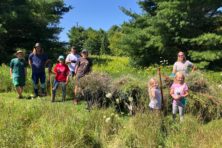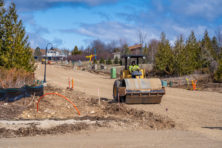Sustainability Issue 2022: We Don’t Always Have to Pave Paradise
- Share
- Tweet
- Pin
- Share
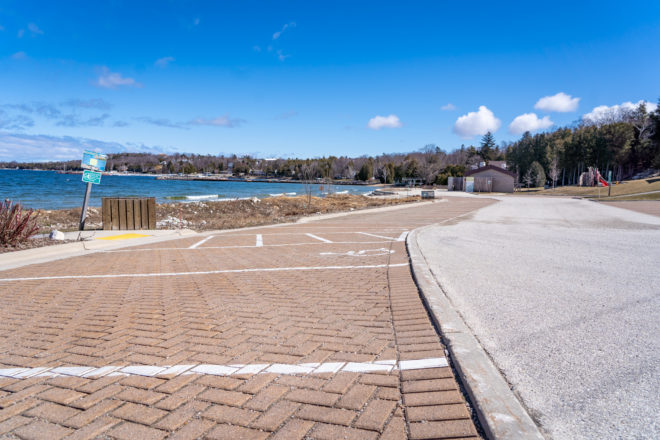
Some communities are warming up to water-permeable parking lots and roadways
Bigger parking lots, buildings and homes – and new development in general – have contributed to speedier rainwater runoff, more flash flooding and more nutrients and pollution entering waterways nationwide.
But gradually, local governments, businesses and organizations have warmed up to ways to soak up and retain stormwater. Not surprisingly, nature-preserve operators including The Nature Conservancy, Door County Land Trust and The Ridges Sanctuary have avoided hard-surface parking lots almost completely.
SOAK UP THE RAIN
The Fresh Coast Research Center (freshcoastguardians.com) is trying to capture and slow the flow of the first half-inch of rainfall to reduce the amount of stormwater that rushes into the City of Milwaukee sewer system and waterways. In keeping with the U.S. Environment Protection Agency’s Soak Up the Rain initiative, the center employs green infrastructure and looks for locations for porous surfaces and retention areas.
Five years ago on the site of the former Sandpiper restaurant, The Ridges tore out the blacktop parking lot while constructing its nature center and headquarters. Then the conservation organization installed the first water-permeable GeoPave parking lot in northeastern Wisconsin. The Ridges’ executive director, Andy Gill, said the unusual parking lot performs great while holding up well to traffic, snow blowers and careful plowing.
Most important, the permeable surface keeps most of the rainwater from rushing off the property into storm drains and the adjacent Lake Michigan waters. Instead, that water soaks down into the tons of gravel held in place by a recycled-plastic grid. The GeoPave grid was installed as the top layer of the porous parking lot. Thus, The Ridges has no blacktop for any of its trailhead or visitor-center lots.
“We didn’t pave over paradise,” Gill said.
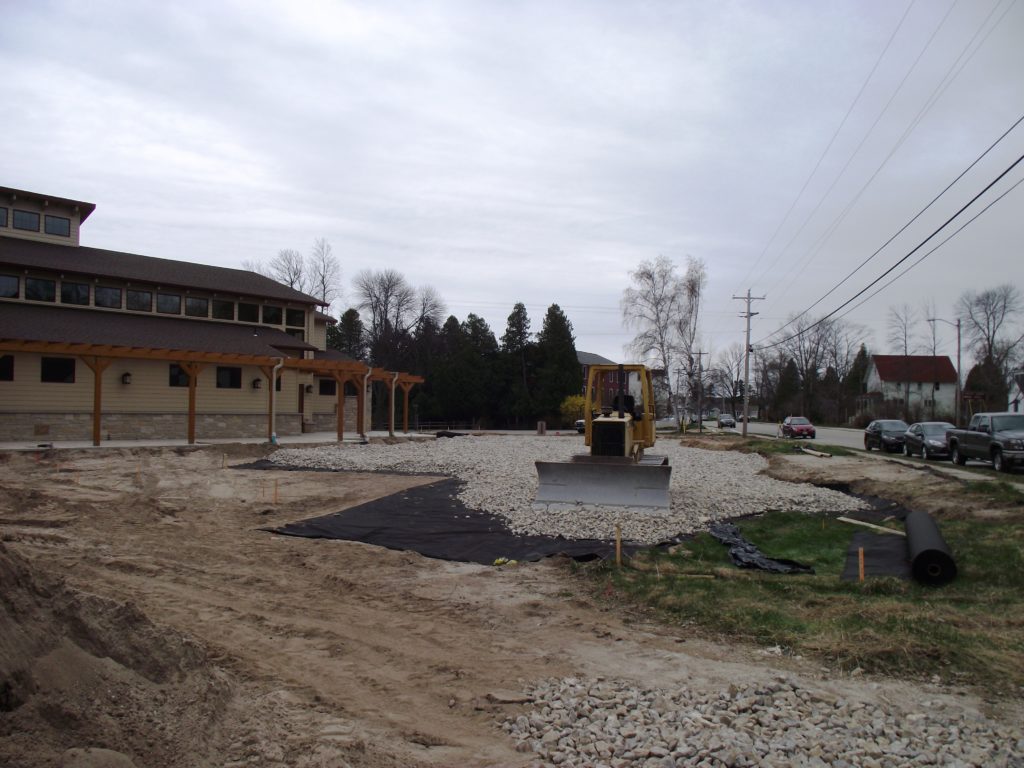
Wisconsin-based Presto Geosystems installs the fabric screen and base gravel in 2017 during the installation of a water-permeable parking lot at The Ridges Sanctuary in Baileys Harbor. Photo by Ridges volunteer Ed Miller. 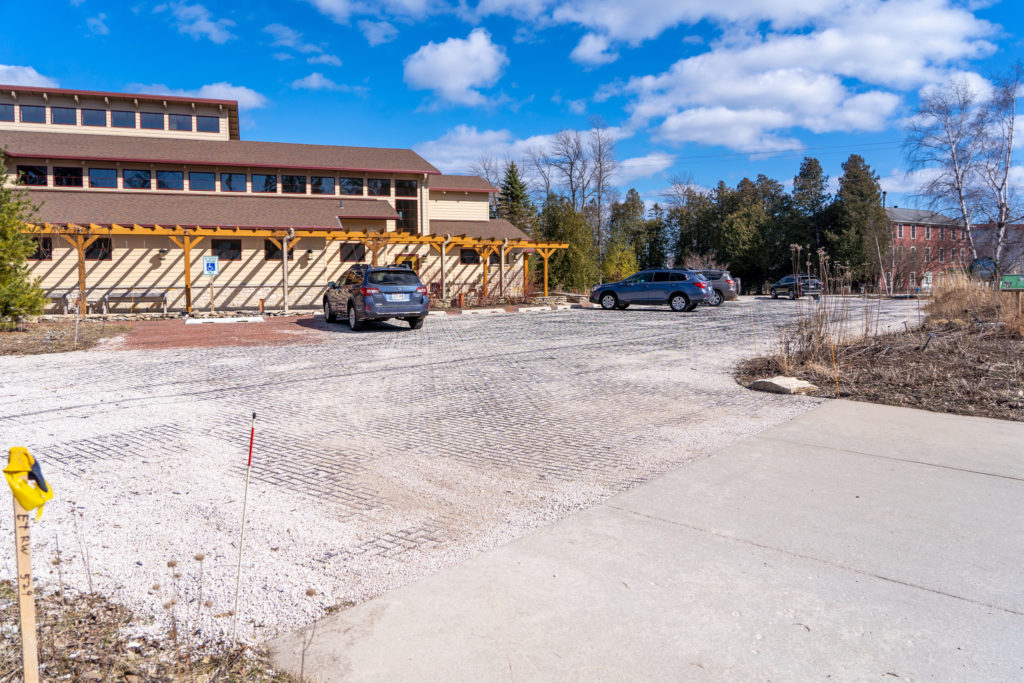
The Ridges parking lot as it looks today. Photo by Rachel Lukas.
He said The Ridges staff and volunteers encountered a learning curve on maintaining the lot as they learned to put shoes on truck plows to keep the snowplow blade an inch above the plastic grid to avoid breaking it. Also, at the end of the winter, volunteers must shovel and push gravel back into the grid after some of it gets pushed into the lawn along with the snow. Other than that, the lot requires little maintenance.
The director of Wisconsin-based Presto Geosystems, Michael Dickey, said his company – a subsidiary of Reynolds Consumer Products – features The Ridges Sanctuary’s parking lot online as a case study of successful products and projects. Although The Ridges wanted to set an example and protect the nearby lakeside environment, Dickey said most of his water-permeable projects are done for customers who need to satisfy various states’ natural-resources regulations.
State agencies require developers to build retention ponds or even expensive underground water-retention vaults, so Dickey said that avoiding those costs by installing water-permeable GeoPave (or GeoBlock) for all or part of a lot often makes financial sense.
“When you use porous pavement, you avoid the runoff in the first place,” he said.
Dickey said his company is a leader in providing engineers with a solution “rather than digging a big hole in the ground.” Those solutions also include permeable paving for islands in roadways and parking lots, as well as in low-traffic areas.

Other Permeable Options Are in Practice Locally
Most Door County roads have blacktop or concrete pavement. All streets, alleys or lots maintained by the City of Sturgeon Bay have impervious pavement, and that’s not unusual statewide. The Wisconsin Department of Natural Resources said parking lots and roads for heavy trucks are not suitable for most permeable paving, nor are lots for vehicle fueling, chemical sites, or industrial loading and storage areas.
Asphalt covers parking lots in Peninsula, Whitefish Dunes and Potawatomi state parks. The same goes for the lots in most of the 19 county parks, though Door County Parks manager Burke Pinney said he will consider water-permeable options when parking lots and walkways need replacement.
Pinney said that in many situations, the county should follow the lead of the Village of Egg Harbor, which created more parking along its beach while also cutting back on the amount of runoff (and goose and gull waste) into the harbor.
Megan Sawyer, Egg Harbor’s village administrator, said the replacement of the beach parking lot with H2O Pro Pavers on a permeable base – along with the installation of vegetation and a dune between the lot and the beach – nearly eliminated the runoff problem altogether. The project contractor, County Materials, reports similar success with the pavers for a parking area at a Madison dog park and “green alleys” in Dubuque, Iowa.
GREEN SAVINGS
A City of Oshkosh report concluded that, over 25 years, installation and maintenance of a permeable-surface lot would cost $306,700, compared to $371,000 for a standard asphalt lot of the same size. That takes into account a projected need for occasional vacuuming to clear clogs and obstructions in permeable pavement, and the occasional crack-filling, patching and seal-coating needs of a blacktop lot.
Anclam Park – south of Baileys Harbor’s business center – has a porous, water-permeable pavement that looks a lot like blacktop. Ryan Weisgerber, the town’s public works manager, said the porous paving holds up well to plowing and has not been damaged by freezing and thawing. He said he has seen occasional compressions left by tires of vehicles parked there.
Travis Thyssen, Gibraltar’s town administrator, said asphalt and concrete cover the municipal roadways, lots and walks in Fish Creek, but some private properties such as Whistling Swan have permeable paving. He said the town will add a water-permeable surface near a hairpin turn a mile south of Fish Creek during an improvement and widening project on the historical Cottage Row.
For years, truck drivers making deliveries to Cottage Row homes and projects found the 120-degree turn impossible to navigate and had difficulty turning around. Thyssen said the town will seek contractors to construct a turnaround that will have weight-bearing, water-permeable tiles in the middle. He said grass should be able to grow in between the tiles in the truck-friendly turnaround.

